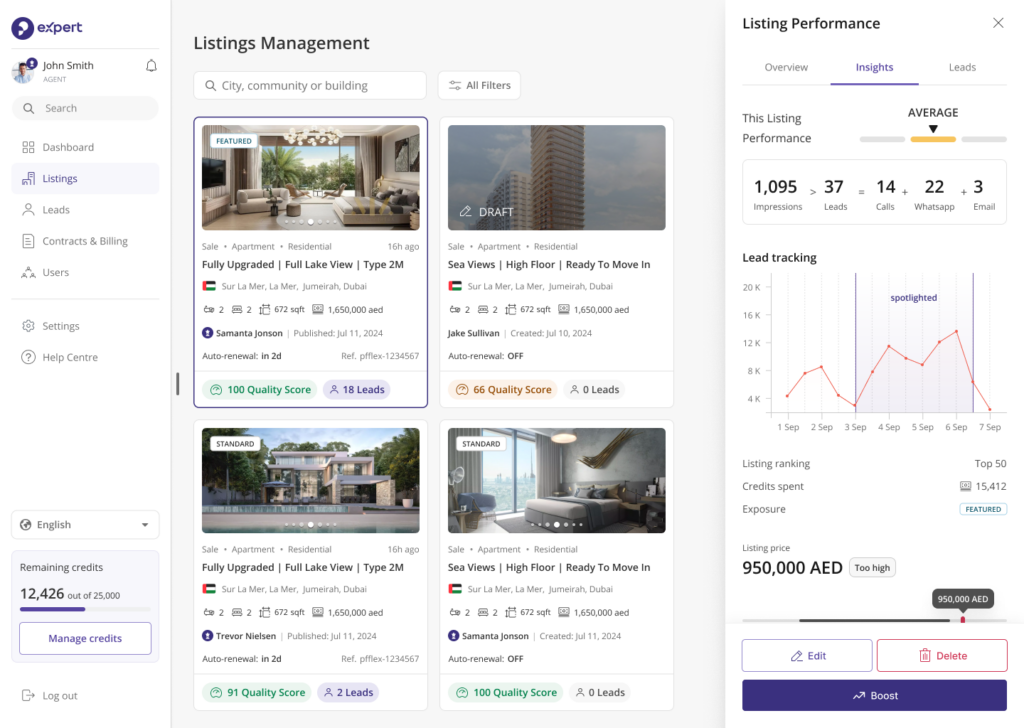Dubai’s real estate market is like a series of cities within a city. There are regions full of tall buildings, fancy homes by the water, sleek developments, million-dollar homes, as well as commercial districts where people work and shop. Dubai is always building something new and amazing, making it a super exciting place to be. It also means there are many, many real estate opportunities for the savvy agent or brokerage owner, like you!
The Dubai real estate market is based on connections. So, building and maintaining a strong client database in the industry can help you stay ahead of the competition, by building long-term relationships, and helping you get repeat business.
Property Finder’s helpful guide walks you through the importance of a client database, the essential data points to capture, and other practical tips for keeping your information accurate and up-to-date. We will also look at the built-in CRM (Customer Relationship Management) database, a valuable tool for Dubai real estate professionals, while checking alternative CRM options, including a simple spreadsheet like Excel. In this guide we’ll use the terms “client database” and “CRM” interchangeably, since they perform the same essential functions.
Understanding the Importance of a Real Estate Client Database

Image Source: Pexels
You can think of a client database as a folder where you keep all the important information about the people you work with (or want to work with), like clients, potential customers, and even new leads you haven’t contacted. This database helps you remember things like the names and contact numbers of potential customers, what kind of property they’re looking for, and what exactly is their current need.
Using the right quality real estate CRM, you will
- Build Stronger Relationships
Having your client’s data within reach helps you to constantly remember their details and ensure you’re regularly communicating with them. By doing this, they’ll feel valued and build a strong connection with you and your real estate agency.
- Repeat Business & Referrals
Staying in touch with past real estate clients through CRM tools increases the chances they’ll reach out to you when they’re looking for their next property or recommend you to others.
- Make Informed Decisions
Analyzing your database also helps you to spot trends and make smart choices that can give you a competitive edge. For example, is there a particular day of the week or time of day that your potential customers open emails from you more often? Who are the potential customers that open most of your emails?
- Engage in Targeted Advertising
When you understand your clients’ wants and target them with personalized marketing, you maximize your advertising impact, because your communication is relevant and valuable.
If you are a real estate agent, having a client database is just as important as your listings. It helps you keep in touch with clients, get repeat business, and make smart decisions. For example, if you have a listing in a neighborhood you know some of your clients are interested in, you can send a message to just those clients, quickly and easily.
Choosing the Right Tool to Manage Your Real Estate Client Database
There are many ways to manage your client’s information, and each option has its own advantages. Turning your stack of business cards or contacts on your phone into a full fledged client database can be done using various CRM tools, including:
Property Finder’s Built-In CRM: “PF Expert”
As a Property Finder agent, you have access to a built-in CRM, called “PF Expert”. It’s specifically designed for real estate agents and marketers who want to be successful in the Dubai real estate market. This platform offers features like lead capture forms, automated communication tools, and detailed reporting functionalities. Connect with one of Property Finder’s representatives for a free consultation.

Client Database Apps
Numerous mobile and web-based client database apps are available. Some of these include Zoho, Zendesk, Monday, Salesforce, and so on. They offer varying levels of functionality and customization. In many cases they have a free trial or a free version, but may limit the number of clients you can input, or limit your access to other important features.
When choosing, it is advisable to consider factors like budget, ease of use, and integration with other tools. You don’t want to invest the time to enter all of your contacts and prospects, only to have to do it again later, on a different platform, if you made the wrong choice. Probably some of the most important things to consider are what tools the app offers to help you manage and contact your leads and customers, as well as how expensive it will be over the long term.
Spreadsheet (Excel):
While not as sophisticated as CRM platforms, a well-designed spreadsheet in Excel can be a simple and cost-effective way to manage your database. Although it is important to note that maintaining data integrity and scaling your operations might get challenging with a spreadsheet as your database grows beyond a few hundred contacts. You’ll also want to think carefully about what fields you want in your spreadsheet, and ensure you enter the information the same way every time.
Regardless of the real estate CRM platform you choose, ensure it allows you to:
- Easily Add and Edit Information: Entering and updating client data should be a smooth and efficient process. If it’s overly complicated, you won’t want to do it.
- Organize and Segment: Group real estate clients and real estate leads based on specific criteria for targeted communication, for example the neighborhoods they’re interested in or their budget.
- Track Interactions: Record and monitor communication history with each client, including emails, texts, and phone calls. You want to remember how often you’re communicating or reaching out.
- Generate Reports: Ability to analyze data and generate reports. Good customer and real estate prospect reports help you make good decisions.
Choosing the right platform for your real estate client list is very important. It helps make your work easier, keeps your clients happy, and helps your business grow.

Image Source: Pexels
Key Data Points to Include in Your Real Estate CRM
To build a comprehensive client database that improves your sales, there are relevant data points, or information, that provide insights into your customer’s preferences, behavior, and interactions. Some essential ones to include are:
- Basic Contact Information: This includes names, phone numbers, email addresses, and physical addresses (with permission).
- Demographic Information: Age, marital status, and number of dependents can provide valuable insights into potential apartment, housing, or neighborhood needs and preferences.
- Real Estate Interests: Are they looking to buy, rent, sell, or invest? What type of property interests them (apartments, villas, commercial spaces)?
- Budget Range: Understanding what your customer is willing and able to spend on their dream home or other property helps you tailor your approach and identify suitable options to show them.
- Timeline: When are they planning to purchase or sell? Knowing their time frame is necessary for staying ahead of their needs.
- Other Preferences: Do they have a preferred location, amenities, or property features (like a swimming pool or number of bathrooms)?
- Source: How did you connect with them (referral, website form, open house)? Knowing this helps you understand where your customers come from, so you can get more of them.
- Notes: This section is for any additional details you glean from interactions, such as specific needs, interests, histories, or past conversations.
Remember to always obtain consent before adding someone to your database and ensure you comply with local data privacy regulations.

Image Source: Pexels
Strategies for Data Entry and Accuracy, So Your Marketing Efforts Always Pay Off
Sometimes, entering and updating all that information can feel like a big task. Thankfully, Customer Relationship Management (CRM) tools make this task easier by organizing and managing all your client information in one place.
We’ve detailed five simple processes or steps for entering and maintaining accurate client data using CRM tools.
- Simplify Data Entry
CRM tools often provide user-friendly interfaces with customizable fields, making it easy to enter client information accurately. Stick to essential details like names, contact information, and property preferences to keep data entry simple and efficient.
- Utilize Automation
Take advantage of automation features offered by CRM tools to streamline data entry processes. For example, you can set up automated forms or workflows to capture client information directly from online inquiries or email communications, reducing manual entry errors. Property Finder’s Built-In CRM does this exceptionally well.
- Implement Data Validation
Many CRM tools include built-in validation rules to ensure data accuracy. These rules can flag incomplete or incorrect entries, helping you to see and correct them before saving. By enforcing data validation, you maintain a higher standard of accuracy across your database. Accuracy makes your CRM useful.
- Segmentation and Tagging
Use CRM tools to segment your client database based on specific criteria, such as property preferences or transaction history. By categorizing clients into groups or using tags, you can streamline your communications and marketing efforts more effectively, improving engagement and conversion rates from real estate leads to happy customers.
- Regular Maintenance
Schedule regular audits (maybe once every 3 months) and clean-up sessions to ensure your CRM database remains accurate and up-to-date. Remove duplicate entries, update outdated information, and verify contact details to prevent data degradation over time.
Structuring your real estate client database accurately and maintaining it makes everything easier to find and keeps things running smoothly.
Nurturing Client Relationships to Get The Most Sales
Much more than just collecting data, effective customer database management involves actively nurturing real estate client relationships. To do that, follow these three important tips:
- Personalized Communication: Use what you know about your real estate leads and clients to send them messages that feel like they were written just for them.
- Regular Follow-Ups: Stay connected with past clients by checking in with them regularly, whether it’s through emails, direct phone calls, newsletters, invitation to events, or sending them a friendly holiday note.
- Value-Added Services: Show your clients you care by offering them extra perks like insider market insights, virtual real estate events, updates on properties they might like, or special deals just for them.
By focusing on personalized communication, regular follow-ups, and providing value-added services, you can strengthen your client relationships, so they come back to you with new real estate needs or real estate referrals. This will keep your real estate business thriving.
Key Takeaway
A well-maintained real estate CRM is an invaluable asset for any Dubai real estate professional who wants to be successful. By implementing the best practices outlined in this guide, hard working real estate professionals, like you, can more quickly get and close new potential customers, enhance client relationships, drive repeat business, and position themselves for long-term success in the market.
Whether you opt for a sophisticated CRM system like Property Finder’s Built-In CRM or utilize simpler tools like Excel, the most important thing is capturing relevant data points, ensuring accuracy, and actively following-up on real estate leads and your happy real estate customers.








